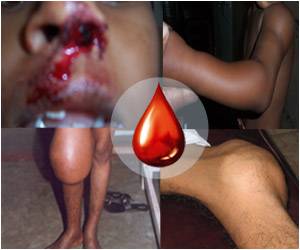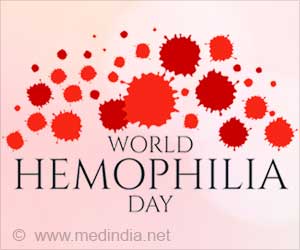- Blood doesn’t clot in hemophilic patients due to the lack of clotting proteins
- Anti-Hemophilic Factor (AHF) injection is the only possible treatment, but its costly and neither developed nor readily available in India
- Excessive bleeding sometimes leads to death
What is Hemophilia?
Hemophilia is a genetic and life-threatening bleeding disorder. Due to the lack of clotting proteins even with the slightest cut, patients’ blood does not clot normally. This ailment needs to be taken special care or else it leads to recurrent and prolonged bleeding into joints and muscles sometimes leading to permanent disability and even worse, to death at times. Infusion of Anti-Hemophilic Factors (AHF), seems to be the only possible treatment that is quite expensive. (One unit of Factor costs approximately Rs. 10-12, and during any bleeding episode, a person requires 500 to 2,000 IUs in one shot, resulting in an average expenditure of Rs. 5,000 to Rs. 20,000.)About Hemophilia Federation (India)
Hemophilia Federation (India) is a non-profit, organization working for the welfare of people suffering from hemophilia. They have a network of almost 90 Chapters spread across the country, aiming to reach out to more and more people suffering from hemophilia.The organization also aims to provide quality care, affordable treatment, educational and psycho-social support, and economic rehabilitation. The Federation has been voicing about hemophilia for the last 39 years.
World Hemophilia Day
Hemophilia is a rare disorder that often goes unnoticed because of a lack of awareness. Massive sensitization drives are needed to make people aware of this rare genetic disorder. World Hemophilia Day is one of the main initiatives that is observed globally in 140 countries to stimulate the same.Main Concerns
- Healthcare practitioners are not aware of the ailment.
- Huge lack of procurement of AHF.
- Uneven distribution of AHF.
- No good hemophilia policy at the state and central levels.
- Women can also have hemophilia but it is of a much rarer concern.
Government Working on the Issue
The most important component of human existence is blood. Considering the importance, and future projection and prevention and proving effective management, the Government of India has prepared comprehensive guidelines for prevention and control of hemoglobinopathies (Thalassemia, Sickle cell anemia and other variant anemia).Vision for Future
- Ensuring the infrastructure required for networking of services at different levels of health care.
- Strengthened to ensure screening of children and the antenatal mothers.
- Training of the required staff involved in the program for blood disorders.
- Providing optimal care to all patients of thalassemia, sickle cell disease, and hemophilia by establishing daycare facilities for transfusion and infusion, monitoring with the help of state health departments.
- Provide financial support for obtaining medicines like iron chelation, AHF, and other necessary drugs in coordination with the state health department.
- Awareness programs for hemoglobinopathies and hemophilia must be organized.
- A national registry is being created which would be worthwhile and would be an important tool for planning future patient services.
- Health fraternity and doctors must be made consciously aware for the same.
Source-Medindia















